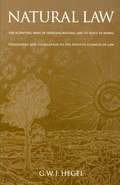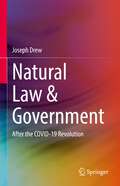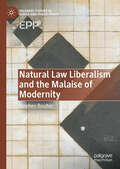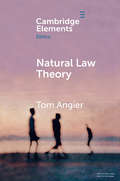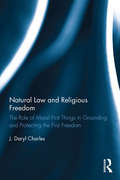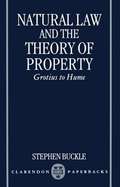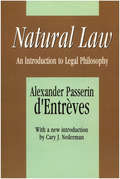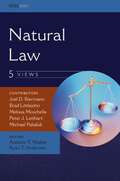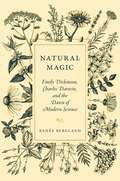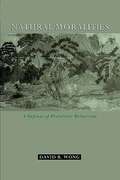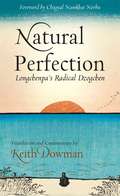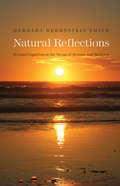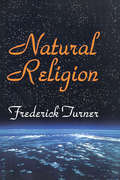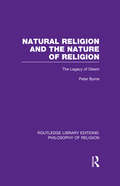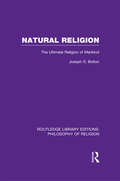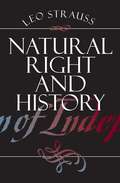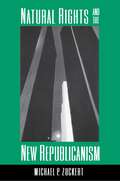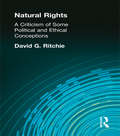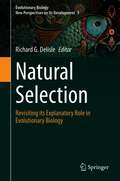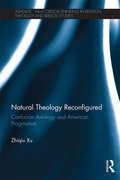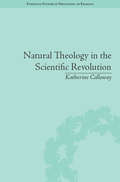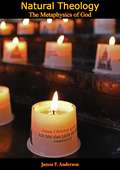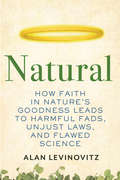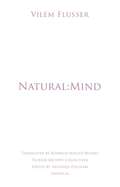- Table View
- List View
Natural Law
by John R. Silber T. M. Knox H. B. Acton Georg Wilhelm Friedrich HegelOne of the central problems in the history of moral and political philosophy since antiquity has been to explain how human society and its civil institutions came into being. In attempting to solve this problem philosophers developed the idea of natural law, which for many centuries was used to describe the system of fundamental, rational principles presumed universally to govern human behavior in society. By the eighteenth century the doctrine of natural law had engendered the related doctrine of natural rights, which gained reinforcement most famously in the American and French revolutions. According to this view, human society arose through the association of individuals who might have chosen to live alone in scattered isolation and who, in coming together, were regarded as entering into a social contract.In this important early essay, first published in English in this definitive translation in 1975 and now returned to print, Hegel utterly rejects the notion that society is purposely formed by voluntary association. Indeed, he goes further than this, asserting in effect that the laws brought about in various countries in response to force, accident, and deliberation are far more fundamental than any law of nature supposed to be valid always and everywhere. In expounding his view Hegel not only dispenses with the empiricist explanations of Hobbes, Hume, and others but also, at the heart of this work, offers an extended critique of the so-called formalist positions of Kant and Fichte.
Natural Law & Government: After the COVID-19 Revolution
by Joseph DrewSince the dawn of civilisation philosophers and sages alike have been concerned about the potential for government to become a Leviathan-like monster. In this book Professor Drew shows how a careful application of natural law principles can mitigate this threat of Leviathan and also contribute to the flourishing of people. To do so Natural Law and Government examines the trade-off between human dignity and the common good during the public policy response to COVID-19. Specifically, Professor Drew details his concerns regarding the emergence of concentrations of power and competence in government – changes that have sadly given rise to the repression of the vitality of citizens. This ground-breaking work explains the changes to thinking, institutions and public management that are necessary for people to reclaim their right to thrive as humans. In sum, this is a handbook for what needs to be done after the COVID-19 revolution.
Natural Law Liberalism and the Malaise of Modernity (Palgrave Studies in Ethics and Public Policy)
by Stephen BoulterThis book examines modernity itself. A single overarching policy recommendation is defended, namely, that the West ought not to defect from modernity’s core commitments to the sciences, market economics and liberal democracy despite the litany of complaints that have been, and continue to be levelled against it. But in addition to this overarching recommendation, numerous policy suggestions are made. The reader will find discussions as wide-ranging as electoral regimes and judicial procedure, banking regulations and the ethics of a modern civil service. What binds these disparate subsidiary recommendations together is that they are designed to meet the challenges facing modernity while remaining true to its core commitments. These subsidiary policy recommendations, in turn, are not developed in an ad hoc manner, but are themselves motivated by a distinct philosophy of modernity which is termed natural law liberalism.
Natural Law Theory (Elements in Ethics)
by Tom AngierIn Section 1, I outline the history of natural law theory, covering Plato, Aristotle, the Stoics and Aquinas. In Section 2, I explore two alternative traditions of natural law, and explain why these constitute rivals to the Aristotelian tradition. In Section 3, I go on to elaborate a via negativa along which natural law norms can be discovered. On this basis, I unpack what I call three 'experiments in being', each of which illustrates the cogency of this method. In Section 4, I investigate and rebut two seminal challenges to natural law methodology, namely, the fact/value distinction in metaethics and Darwinian evolutionary biology. In Section 5, I then outline and criticise the 'new' natural law theory, which is an attempt to revise natural law thought in light of the two challenges above. I conclude, in Section 6, with a summary and some reflections on the prospects for natural law theory.
Natural Law and Religious Freedom: The Role of Moral First Things in Grounding and Protecting the First Freedom
by J. Daryl CharlesEvery successive generation finds fresh reasons for the study of natural law. Current interest in the natural law may well be due to a pervasive moral pessimism in the Western cultural context and wider contemporary geopolitical challenges. Those geopolitical challenges result from two significant and worrisome global developments – unprecedented violent persecution of religious minorities on several continents and a growing climate of secular hostility toward religious faith in Western societies. Natural Law and Religious Freedom aims to address what is relatively absent from the literature by demonstrating the importance of natural law ethics in both establishing and preserving basic human rights, of which religious freedom has pride of place. Probing contemporary challenges to natural law thinking that are both internal and external to religious faith, and examining the character and constitution of natural law ethics, Natural Law and Religious Freedom will be of interest to theologians, ethicists and philosophers as well as policy analysts, politicians and activists who are concerned to anchor religious freedom and human rights policy considerations in an enduring way.
Natural Law and the Theory of Property: Grotius to Hume
by Stephen BuckleIn this book, Stephen Buckle provides a historical perspective on the political philosophies of Locke and Hume, arguing that there are continuities in the development of seventeenth- and eighteenth-century political theory which have often gone unrecognized. He begins with a detailed exposition of Grotius's and Pufendorf's modern natural law theory, focusing on their accounts of the nature of natural law, human sociability, the development of forms of property, and the question of slavery. He then shows that Locke's political theory takes up and develops these basic themes of natural law. Buckle argues further that, rather than being a departure from this tradition, the moral sense theory of Hutcheson and Hume represents an attempt--which is not entirely successful--to underpin the natural law theory with an adequate moral psychology.
Natural Law: An Introduction to Legal Philosophy
by Alexander Passerin d'EntrevesThis is the classic study of the history and continuing philosophical values of the law of nature. D'Entreves discerned three distinct sources that have contributed to the development of natural law: Roman law teachings, Christian beliefs regarding law, and egalitarian and revolutionary theories of the Enlightenment. Now regarded as a classic work, Natural Law has exercised considerable influence over the course of Anglo-American legal theory in the past forty years. The statements of Clarence Thomas during his 1991 Senate confirmation hearings show that the law of nature still holds powerful appeal in defining judicial rules.In the new introduction, Cary J. Nederman points out both the contemporary value and the historical significance of Natural Law. He also provides the biographical as well as intellectual context for d'Entreves immense accomplishments. This volume is essential reading for students of legal history, political theory, and philosophy. It will also be of interest to historians.Few texts provide as concise or as cogent an introduction to natural theory as Alexander Passerin d'Entreves' Natural Law: An Introduction to Legal Philosophy.... Transaction Publishers has performed a genuine service by bringing out a new edition of Natural Law. D'Entreves' analysis is clear and penetrating, and will guide the student of natural law to further, fruitful study.—Mitchell Muncy, The University Bookman
Natural Law: Five Views (CriticalPoints Series)
by ZondervanThe story of "natural law" - the idea that God has written a law on the human heart so that ethical norms derive from human nature - in twentieth-century Protestant ethics is one of rejection and resurgence. For half a century, luminaries like Karl Barth, Carl F. H. Henry, and Cornelius Van Til cast a shadow over natural law moral reflection because of its putative link to natural theology, autonomous reason, associations with Catholic theology, and ethical witness devoid of special revelation. However, over the past twenty years, Protestant theologians have renewed their interest in the subject, often animated by debates on Christian involvement in the public arena and on matters of life, death, and gender and sexuality. Much of this engagement has happened within Reformed circles and has largely been conducted without reference to Roman Catholic construals of the natural law. Conversely, Catholic developments in natural law thinking have paid little attention to the surge of interest on the Protestant side. As a result, Protestant and Catholic natural proponents - and even those skeptical of the natural law - are not in conversation with one another.The lack of dialog between the various schools of natural law has left a historic tradition within Christian moral thought underdeveloped in contemporary Protestant theology. By bringing together a variety of perspectives in much-needed conversation, this book helps readers to understand the various construals of natural law within the broader strands of Christian and classical traditions and clarifies its unique importance for Christian moral witness in a secular culture. The contributors address the following questions:What is natural law?Can moral norms be derived from immanent, creaturely ends? If so, how specific or action-guiding can those norms be? How extensive might these moral norms be?How does natural law endure despite Christian insistence on the noetic, epistemological effects of sin?What is the relationship between Christian reflection on natural law and the broader classical tradition's understanding of natural law?How do Catholic and Protestant construals of natural law differ?What is the relationship between faith and reason?What's the relationship between human nature and natural law?Does "natural law" mean: "secular moral reasons"? Or is "natural law" merely religious belief disguised as public reason?How does natural law relate to public reason?Does the affirmation of a "natural law" lead to a natural theology? Or are these distinct?What is the relationship between natural law and the laws of nature?Five views:Classical Natural Law - Michael PakalukNew Natural Law - Melissa MoschellaReformed Natural Law - W. Bradford LittlejohnLutheran Natural Law - Joel D. BiermanAnti-Natural Law - Peter J. Leithart
Natural Magic: Emily Dickinson, Charles Darwin, and the Dawn of Modern Science
by Renée BerglandA captivating portrait of the poet and the scientist who shared an enchanted view of natureEmily Dickinson and Charles Darwin were born at a time when the science of studying the natural world was known as natural philosophy, a pastime for poets, priests, and schoolgirls. The world began to change in the 1830s, while Darwin was exploring the Pacific aboard the Beagle and Dickinson was a student in Amherst, Massachusetts. Poetry and science started to grow apart, and modern thinkers challenged the old orthodoxies, offering thrilling new perspectives that suddenly felt radical—and too dangerous for women.Natural Magic intertwines the stories of these two luminary nineteenth-century minds whose thought and writings captured the awesome possibilities of the new sciences and at the same time strove to preserve the magic of nature. Just as Darwin&’s work was informed by his roots in natural philosophy and his belief in the interconnectedness of all life, Dickinson&’s poetry was shaped by her education in botany, astronomy, and chemistry, and by her fascination with the enchanting possibilities of Darwinian science. Casting their two very different careers in an entirely fresh light, Renée Bergland brings to life a time when ideas about science were rapidly evolving, reshaped by poets, scientists, philosophers, and theologians alike. She paints a colorful portrait of a remarkable century that transformed how we see the natural world.Illuminating and insightful, Natural Magic explores how Dickinson and Darwin refused to accept the separation of art and science. Today, more than ever, we need to reclaim their shared sense of ecological wonder.
Natural Moralities: A Defense of Pluralistic Relativism
by David B. WongIn this book, David B. Wong defends an ambitious and important new version of moral relativism. He does not espouse the type of relativism that says anything goes, but he does start with a relativist stance against alternative theories such that there need not be only one universal truth. Wong proposes that there can be a plurality of true moralities existing across different traditions and cultures, all with one core human question as to how we can all live together.
Natural Perfection
by Chogyal Namkhai Norbu Keith Dowman Lonchen RabjamDzogchen, or the "Great Perfection," is considered by many to be the apex of Tibetan Buddhism, and Longchen Rabjam is the most celebrated of all the saints of this remarkable tradition. Natural Perfection presents the radical precepts of Dzogchen, pointing the way to absolute liberation from conceptual fetters and leading the practitioner to a state of pure, natural integration into one's true being.Transcending the Tibetan context or even the confines of Buddhist tradition, Longchen Rabjam delivers a manual full of practical wisdom. Natural Perfection is a shining example of why people have continued to turn to the traditions of Tibet for spiritual and personal transformation and realization. Keith Dowman's illuminating translation of this remarkable work of wisdom provides clear accessibility to the profound path of Dzogchen in the here-and-now.
Natural Reflections: Human Cognition at the Nexus of Science and Religion
by Barbara Herrnstein SmithIn this important and original book, eminent scholar Barbara Herrnstein Smith describes, assesses, and reflects upon a set of contemporary intellectual projects involving science, religion, and human cognition. One, which Smith calls "the New Naturalism," is the effort to explain religion on the basis of cognitive science. Another, which she calls "the New Natural Theology," is the attempt to reconcile natural-scientific accounts of the world with traditional religious belief. These two projects, she suggests, are in many ways mirror images--or "natural reflections"--of each other. Examining these and related efforts from the perspective of a constructivist-pragmatist epistemology, Smith argues that crucial aspects of belief--religious and other--that remain elusive or invisible under dominant rationalist and computational models are illuminated by views of human cognition that stress its dynamic, embodied, and interactive features. She also demonstrates how constructivist understandings of the formation and stabilization of knowledge--scientific and other--alert us to similarities in the springs of science and religion that are elsewhere seen largely in terms of difference and contrast. InNatural Reflections,Smith develops a sophisticated approach to issues often framed only polemically. Recognizing science and religion as complex, distinct domains of human practice, she also insists on their significant historical connections and cognitive continuities and offers important new modes of engagement with each of them.
Natural Religion
by Frederick TurnerThere is widespread belief that the world's religions con- tradict each other. It follows that if one religion is true, the others must be false--an assumption that implies, and may actually create, religious strife. In Natural Religion, acclaimed poet, critic and essayist Frederick Turner sets out to show that the natural world offers grounds for stating that all religions are, in some respect, true.Through the ages, various ways have been proposed to resolve religious differences. Some argue for the destruction of all religions but one's own. Others substitute an abstract principle for the real ritual and moral practice of religion. Still others doubt all religious truth and, consequently, all truth. Others accept a kind of pluralistic relativism. This book explores syncretism, whereby all religions are seen as grasping the same strange and complex reality, but by very different means and handles. The idea that all religions are true raises a supervening question: if so, what must the real physical universe be like? Turner approaches these questions in terms of scientific inquiry. There is not enough room in space itself to fit in all theologies; but there may be enough room in time if new scientific descriptions of time's nature are to be believed. Turner argues that in the time-models of contemporary cosmological and evolutionary science all times may be connected and time may be infinitely branched and causally looped so that both forward-in-time and backward-in-time factors may be in operation in the same event. Thus, the fundamental substance of the universe may be information rather than matter or energy. The universe is more like a vast living organism than a vast machine.Turner argues that all existing religions can be shown to fit into this model, which in turn points to deeper implications of religious doctrines, languages and practices. There would be plenty of "room" in such a view of time for a tree of different yet linked religious w
Natural Religion and the Nature of Religion: The Legacy of Deism (Routledge Library Editions: Philosophy of Religion)
by Peter ByrneThis study offers students of religion and philosophy introductory chapters concerning the concept of natural religion. It holds that we can’t engage in useful discussion about the present concept of religion without a knowledge of the philosophical history that has shaped that concept. This is discussed with reference to the notion of natural religion to illustrate certain aspects of deism and its legacy. Originally published in 1989.
Natural Religion: The Ultimate Religion of Mankind (Routledge Library Editions: Philosophy of Religion)
by Joseph Shaw BoltonDriven by the dissatisfaction and turmoil in religion at the time this book was originally published in 1923, the author sets out a belief that all people have an inborn religion and investigates what the future of this religion might be as it changes from age to age. In the short chapters here the author reflects on the current trends in theology at the time and the history of Christianity. This is an early critique of formalised religion and a simple advocacy of natural religion which is a glimpse into the basic philosophy of the early twentieth century.
Natural Right and History: Lectures And Essays By Leo Strauss, 1937-1946 (Walgreen Foundation Lectures)
by Leo StraussIn this classic work, Leo Strauss examines the problem of natural right and argues that there is a firm foundation in reality for the distinction between right and wrong in ethics and politics. On the centenary of Strauss's birth, and the fiftieth anniversary of the Walgreen Lectures which spawned the work, Natural Right and History remains as controversial and essential as ever. "Strauss . . . makes a significant contribution towards an understanding of the intellectual crisis in which we find ourselves . . . [and] brings to his task an admirable scholarship and a brilliant, incisive mind."—John H. Hallowell, American Political Science Review Leo Strauss (1899-1973) was the Robert Maynard Hutchins Distinguished Service Professor Emeritus in Political Science at the University of Chicago.
Natural Rights and the New Republicanism
by Michael P. ZuckertIn Natural Rights and the New Republicanism, Michael Zuckert proposes a new view of the political philosophy that lay behind the founding of the United States. In a book that will interest political scientists, historians, and philosophers, Zuckert looks at the Whig or opposition tradition as it developed in England. He argues that there were, in fact, three opposition traditions: Protestant, Grotian, and Lockean. Before the English Civil War the opposition was inspired by the effort to find the "one true Protestant politics--an effort that was seen to be a failure by the end of the Interregnum period. The Restoration saw the emergence of the Whigs, who sought a way to ground politics free from the sectarian theological-scriptural conflicts of the previous period. The Whigs were particularly influenced by the Dutch natural law philosopher Hugo Grotius. However, as Zuckert shows, by the mid-eighteenth century John Locke had replaced Grotius as the philosopher of the Whigs. Zuckert's analysis concludes with a penetrating examination of John Trenchard and Thomas Gordon, the English "Cato," who, he argues, brought together Lockean political philosophy and pre-existing Whig political science into a new and powerful synthesis. Although it has been misleadingly presented as a separate "classical republican" tradition in recent scholarly discussions, it is this "new republicanism" that served as the philosophical point of departure for the founders of the American republic.
Natural Rights: A Criticism of Some Political and Ethical Conceptions
by Ritchie, David GFirst published in 2002. Routledge is an imprint of Taylor & Francis, an informa company.
Natural Science
by Immanuel Kant Eric WatkinsThough Kant is best known for his strictly philosophical works in the 1780s, many of his early publications in particular were devoted to what we would call 'natural science'. Kant's Universal Natural History and Theory of the Heavens (1755) made a significant advance in cosmology, and he was also instrumental in establishing the newly emerging discipline of physical geography, lecturing on it for almost his entire career. In this volume Eric Watkins brings together new English translations of Kant's first publication, Thoughts on the True Estimation of Living Forces (1746-1749), the entirety of Physical Geography (1802), a series of shorter essays, along with many of Kant's most important publications in natural science. The volume is rich in material for the student and the scholar, with extensive linguistic and explanatory notes, editorial introductions and a glossary of key terms.
Natural Selection: Revisiting its Explanatory Role in Evolutionary Biology (Evolutionary Biology – New Perspectives on Its Development #3)
by Richard G. DelisleThis book contests the general view that natural selection constitutes the explanatory core of evolutionary biology. It invites the reader to consider an alternative view which favors a more complete and multidimensional interpretation. It is common to present the 1930-1960 period as characterized by the rise of the Modern Synthesis, an event structured around two main explanatory commitments: (1) Gradual evolution is explained by small genetic changes (variations) oriented by natural selection, a process leading to adaptation; (2) Evolutionary trends and speciational events are macroevolutionary phenomena that can be accounted for solely in terms of the extension of processes and mechanisms occurring at the previous microevolutionary level. On this view, natural selection holds a central explanatory role in evolutionary theory - one that presumably reaches back to Charles Darwin's Origin of Species - a view also accompanied by the belief that the field of evolutionary biology is organized around a profound divide: theories relying on strong selective factors and those appealing only to weak ones. If one reads the new analyses presented in this volume by biologists, historians and philosophers, this divide seems to be collapsing at a rapid pace, opening an era dedicated to the search for a new paradigm for the development of evolutionary biology. Contrary to popular belief, scholars' position on natural selection is not in itself a significant discriminatory factor between most evolutionists. In fact, the intellectual space is quite limited, if not non-existent, between, on the one hand, "Darwinists", who play down the central role of natural selection in evolutionary explanations, and, on the other hand, "non-Darwinists", who use it in a list of other evolutionary mechanisms. The "mechanism-centered" approach to evolutionary biology is too incomplete to fully make sense of its development. In this book the labels created under the traditional historiography - "Darwinian Revolution", "Eclipse of Darwinism", "Modern Synthesis", "Post-Synthetic Developments" - are thus re-evaluated. This book will not only appeal to researchers working in evolutionary biology, but also to historians and philosophers."
Natural Theology Reconfigured: Confucian Axiology and American Pragmatism (Routledge New Critical Thinking in Religion, Theology and Biblical Studies)
by Zhiqiu XuClassic natural theology in its logical, rational, Aristotelian presentation has encountered an impasse. Since the Enlightenment, nature has ceased to be a vital topic in theological discussions until a recent revival of interest stemming from ecological and feminist concerns. Provocatively transcending boundaries between Philosophy and Theology, ancient and contemporary, East and West, Natural Theology Reconfigured revitalises the validity and relevancy of Natural Theology, a shipwrecked concept in the West, with the aid of Eastern Confucian Axiology and American Pragmatism.
Natural Theology in the Scientific Revolution: God's Scientists (Pickering Studies in PHIL of Religion #2)
by Katherine CallowayIn the seventeenth century scientific discoveries called into question established Christian theology. It has been claimed that contemporary thinkers contributed to this conflict model by using the discoveries of the natural world to prove the existence of God. Calloway challenges this view by close examination of five key texts of the period.
Natural Theology: The Metaphysics of God
by James F. AndersonIn this book my sole aim is to present clearly and succinctly for students some central arguments and truths about God in so far as He is known to us in the light of reason. This pedagogical purpose dictates a great deal of compression, lest the student be lost in a labyrinth of dialectical and historical discussion, however important that may be in itself. But compression need not mean oversimplification. It does mean condensing, abridging, epitomizing. This has been done deliberately, in the interest of the student.
Natural: How Faith in Nature's Goodness Leads to Harmful Fads, Unjust Laws, and Flawed Science
by Alan LevinovitzIlluminates the far-reaching harms of believing that natural means "good," from misinformation about health choices to justifications for sexism, racism, and flawed economic policies.People love what's natural: it's the best way to eat, the best way to parent, even the best way to act--naturally, just as nature intended. Appeals to the wisdom of nature are among the most powerful arguments in the history of human thought. Yet Nature (with a capital N) and natural goodness are not objective or scientific. In this groundbreaking book, scholar of religion Alan Levinovitz demonstrates that these beliefs are actually religious and highlights the many dangers of substituting simple myths for complicated realities. It may not seem like a problem when it comes to paying a premium for organic food. But what about condemnations of "unnatural" sexual activity? The guilt that attends not having a "natural" birth? Economic deregulation justified by the inherent goodness of "natural" markets?In Natural, readers embark on an epic journey, from Peruvian rainforests to the backcountry in Yellowstone Park, from a "natural" bodybuilding competition to a "natural" cancer-curing clinic. The result is an essential new perspective that shatters faith in Nature's goodness and points to a better alternative. We can love nature without worshipping it, and we can work toward a better world with humility and dialogue rather than taboos and zealotry.
Natural:Mind (Univocal)
by Vilém FlusserIn Natural:Mind, published for the first time in São Paulo, Brazil, in 1979, Vilém Flusser investigates the paradoxical connection between the concepts of nature and culture through a lively para-phenomenological analysis of natural and cultural phenomena. Can culture be considered natural and nature cultural? If culture is our natural habitat then do we not inhabit nature? These are only some of the questions that are raised in Natural:Mind in order to examine our continual redefinition of both terms and what that means for us existentially. Always applying his fluid and imagistic Husserlian style of phenomenology, Flusser explores different perspectives and relations of items from everyday life. The book is composed of a series of essays based on close observations of familiar objects such as paths, valleys, cows, meadows, trees, fingers, grass, the moon, and buttons. By focusing on things we mostly take for granted, he manages not only to reveal some aspects of their real and obscured nature but also to radically change how we look at them. The ordinary cow will never be seen in the same way again.
